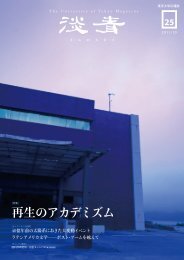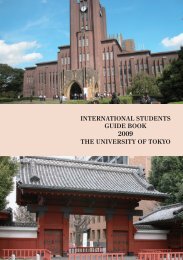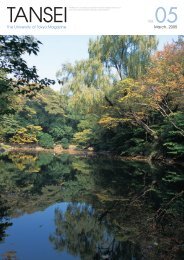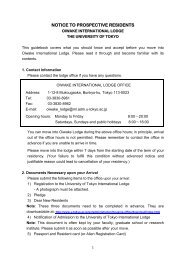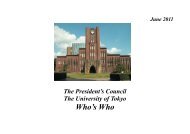brochure
brochure
brochure
Create successful ePaper yourself
Turn your PDF publications into a flip-book with our unique Google optimized e-Paper software.
graduate on time, but in the United States they<br />
leave you to your own resources and you can take<br />
as long as you want.<br />
SK: Probably, Todai has two aspects with different<br />
goals: graduation and research. To graduate,<br />
people actively help you in order to prevent failure.<br />
For research, they provide a good environment, but<br />
it depends on each individual whether he or she<br />
can enjoy this advantage or not.<br />
* 3 Senpai means more experienced seniors, and kohai<br />
means juniors. Senpai often play the role of mentor to<br />
kohai.<br />
F: Do you have any advice or recommendations<br />
to newcomers? Looking back over your time at<br />
Todai, if there were one thing you could change<br />
or “do-over” what would it be?<br />
Messages to<br />
Newcomers<br />
PS: My recommendation to newcomers is to be<br />
prepared. They do not need to be perfect in Japanese,<br />
but they need to be very determined.<br />
MDS: The most important thing for newcomers<br />
to our graduate school is that they are very determined<br />
to study Japanese when they come here. It is<br />
vital that they accept new ways of doing things. If<br />
they want to come and study here, they need to be<br />
open-minded.<br />
JW: Here in Japan, the research work is totally up to<br />
you. The laboratory provides you with the information,<br />
equipment, and material that you need, but<br />
whether you succeed depends on your own efforts.<br />
I think the Japanese lab system or kenkyu-shitsu is<br />
very good and it gives students a lot of support.<br />
FCR: My recommendation for newcomers is to participate<br />
in their labs and interact with their senpai.<br />
This will help them. Is there anything I would like to<br />
“do over”? I wish I had taken more took advantage<br />
of my lab mates. At first I hesitated to talk to them<br />
because I could not speak very good Japanese,<br />
and I felt intimidated. For a while, I was just present<br />
but not really ‘there’. I wish I had mingled more early<br />
on and I encourage students to mingle more in their<br />
labs because it can be really helpful.<br />
SK: It is up to the students to prioritise their needs,<br />
and to decide how they want to spend their time,<br />
whether they just want to enjoy themselves or<br />
whether they want to do good research. If you want<br />
to achieve good results in your research, the environment<br />
is well prepared here. What you have to do<br />
is to prioritize your research and work hard.<br />
I also recommend making acquaintances in your<br />
research field. For me, the conference was very<br />
helpful. Establishing links and networking at conferences<br />
is useful at any stage of a student’s program:<br />
Bachelors, Master’s, or Ph.D. This kind of networking<br />
will open a gateway for other opportunities.<br />
James Joseph<br />
Hiroshi Fegan F<br />
My name is James.<br />
I am British and I work in<br />
the University’s Division of<br />
International Affairs as a<br />
Project Specialist.<br />
I graduated in 1995 from<br />
the Faculty of Engineering<br />
at the University of<br />
Newcastle upon Tyne in<br />
the UK with a Ph.D.<br />
I have worked in various<br />
industries as an Engineering<br />
Manager and Project<br />
Leader before returning to<br />
Japan. I joined the Division<br />
of International Affairs<br />
only a few months ago in<br />
December 2011.<br />
90



